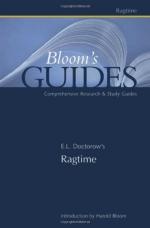|
This section contains 3,728 words (approx. 13 pages at 300 words per page) |

|
SOURCE: "The Politics of Polyphony: The Fiction of E. L. Doctorow," in Twentieth Century Literature, Vol. 37, No. 4, Winter, 1991, pp. 454-63.
In the following essay, Parks applies recent critical theory to a study of the political and historical elements of Doctorow's fiction.
"The chief business of twentieth-century philosophy," R. G. Collingwood remarks in his Autobiography, "is to reckon with twentieth-century history." In the fifty years since Collingwood wrote those words that "reckoning" with history has become increasingly problematic, especially when considering the situation of the contemporary writer. Describing the writer's alienation from history in the modern period, as well as his loss of faith in the direction of history, Georg Lukàcs, in his work The Historical Novel, observes that history for the writer becomes either "a collection and reproduction of interesting facts about the past" or "a chaos to be ordered as one likes" (176,181). More recently, Philip Roth...
|
This section contains 3,728 words (approx. 13 pages at 300 words per page) |

|


